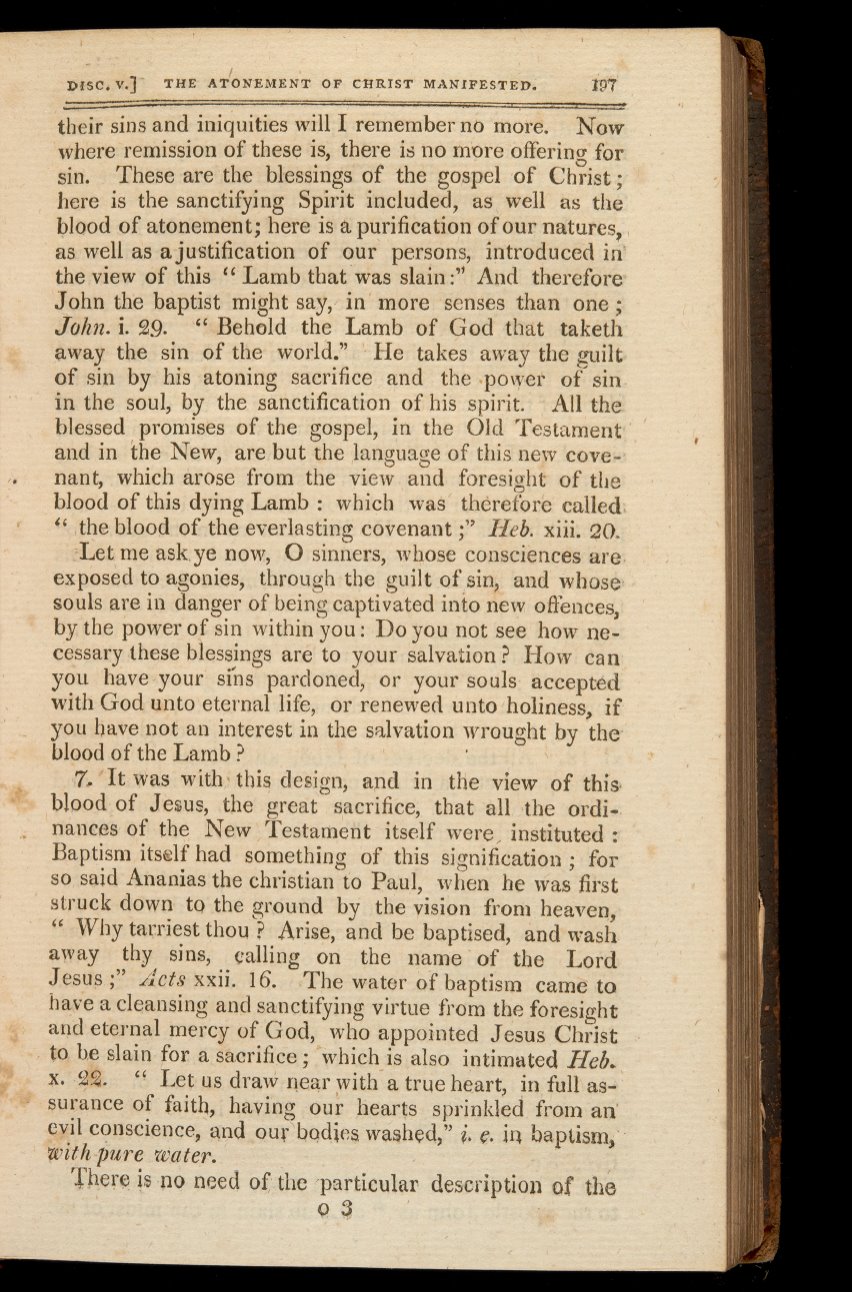

DISC,
v.J
THE ATONEMENT
OF
CHRIST MANIFESTED.
1ß7
their
sins
and
iniquities
will
I
remember
no more.
Now
where remission
of
these
is,
there
is
no more
offering
for
sin.
These are the
blessings
of
the
gospel
of Christ;
here
is
the sanctifying Spirit included,
as
well as
the
blood
of
atonement;
here
is
a purification
of
our natures,
as
well
as
a
justification
of our
persons,
introduced
in
the
view
of
this
"
Lamb
that
was
slain
:"
And
therefore
John
the
baptist
might
say,
in more
senses
than
one;
John.
i.
29.
"
Behold the
Lamb
of God that taketh
away
the
sin
of
the
world."
He
takes
away
the
guilt
of
sin
by his
atoning sacrifice
and
the
.posher
of
sin
in
the
soul, by
the sanctification
of
his
spirit.
All
the
.
blessed promises
of
the gospel, in the Old
Testament
and
in
the
New,
are
but
the language
of
this
new
cove-
nant,
which
arose from the
view
and foresight
of
the
blood
of
this dying
Lamb
:
which was
therefore called
.
the blood
of
the everlasting covenant
;" Heb. xiii.
20.
Let
me
ask,
ye now,
O
sinners, whose consciences
are
exposed to
agonies,
through the guilt
of
sin,
and
whose
souls
are
in
danger
of
being
captivated into
new
offences,
by
the
power
of
sin
within you
:
Do
you
not see
how
ne-
cessary these
blessings
are
to
your
salvation
?
How can
you
have
your
sins
pardoned, or your
souls accepted
with
God
unto eternal life,
or
renewed
unto
holiness,
if
you have
not
an
interest
in
the salvation
wrought
by
the
blood
of
the Lamb
?
7.
'It
was with
this design,
and
in
the
view
of
this
blood of
Jesus, the
great
sacrifice,
that
all
the
ordi-
nances
of
the New
Testament itself were,
instituted
:
Baptism
itself
had something
of
this signification
;
for
so
said
Ananias the christian
to
Paul,
when he
was
first
struck down to the ground
by
the
vision
from heaven,
"
Why
tarriest
thou
?
Arise,
and
be
baptised, and
wash
away
thy
sins,
calling
on
the name
of
the
Lord
Jesus
;"
Acts
xxii.
16.
The water
of
baptism came
to
have a
cleansing and sanctifying virtue from the
foresight
and
eternal
mercy
of God,
who
appointed
Jesus Christ
to be slain
for
a sacrifice;
which
is
also
intimated
Heb.
x.
22.
"
Let
us
draw
near
with
a
true
heart,
in
full
as-
surance of
faith,
having
our hearts
sprinkled
from
an
evil
conscience, and
our'bádies
washed,"
i.
e.
in baptism,'
with
pure
water.
There
is
no need
of
the
'particular
description
of
the
0 3

















